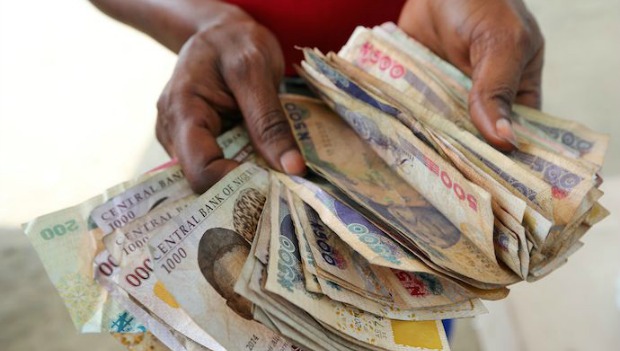The economies of sub-Saharan Africa have felt the pain of 2015 and 2016, and African currencies have experienced volatility as a result.
The year 2017 has been a partial year of recovery or adjustment, depending on who you ask. Still, in the midst of positive results, some currencies are reflecting the economic (and political) pains at home.
Ghana
Nana Akufo-Addo, a new president elected in December 2016, is still battling remnants from the economic challenges of 2016. Numerous economists have lowered projections for Ghanaian economic growth down to around 6 percent, compared to the International Monetary Fund’s original projection of 7.5 percent in 2017.
The growth number has local officials worried. But it is not the growth slowdown that is shocking the currency. The reality is the currency has struggled since the beginning of 2014.
The cedi generally begins the year with significant drops against the American dollar before regaining in the second half. Depreciation hovered near 30 percent in the first halves of both 2014 and 2015, and regained some value by year’s end. This year, the cedi has lost nearly four percent, which is an improvement over previous years. Yet the currency needs a greater bump to help locals. The supply of foreign currency is not matching demand.
The budget, as presented by finance minister Ken Ofori-Atta, should reap benefits for the cedi in the second half of 2017 (an easy bet looking at the aforementioned history of the currency).
Reducing the debt and picking up growth (as well as hitting full stride again a year after the presidential election) could mean great things for Ghana. That said, investors remain cautious as the cedi can be like a petulant child with its movement.
Nigeria
It is good to see Muhammadu Buhari back at work after significant stint with doctors in London. Nigerians are openly pondering what his health concerns may have been (and the government is not delving into the details).
The symptoms to the naira’s bad health is not as opaque. First, the oil price collapse figuratively punched the currency in the gut…the Central Bank of Nigeria loosened its hands on the naira peg in June 2016, consequentially after dollar reserves dried up, and devalued the currency.
The naira dropped approximately 30 percent against the dollar thereafter and has not found stability in the aftermath. The central bank, despite the devaluation last year, has not chosen the Egyptian path by freely floating the currency.
Egypt has benefited from the free floating of the currency with increased investment inflow and a stability with its currency. Nigeria has instead seen aggressive movement in the black market, with the naira striking a historic low above 500 against the dollar earlier this year.
A dollar shortage is only an add-on – a major additive problem since it hurts importers’ ability to conduct business. Crude sales furthermore will not drastically grow anytime soon as prices are set to sit at around $50 as 2018 approaches.
Absent any investment inflow of dollars (most likely from a free floating currency), the naira will be under pressure going into 2018. By the way, low economic growth is not helping the situation.
Zimbabwe
The country with a multi-currency monetary regime could arguably not be included on this list. But all the currencies used in Zimbabwe are under pressure. The drastic inflation in 2008 that basically saw the Zimbabwean dollar plunge to zero led to the introduction of the multi-currency situation of today.
The system initially provided some relief to Zimbabwe. The government adopted it in the 2009 budget and the economy regained some steam and inflation slowed. Yet most of the gains have been obliterated gradually over the past few years. This has happened for a few specific reasons.
First, the dollar ultimately has been the currency of choice for many looking to conduct business and maintain wealth in Zimbabwe.
Secondly, dollars cannot be locked into a country as Zimbabwe is surrounded by non-dollarized countries, thus those traveling outside the country use dollars to get the best value abroad.
Third, Zimbabwe is not tied to the U.S. economy, such as Ecuador and Panama. Thus, Zimbabwe will have to develop a new solution, especially as exports are slow and remittances continue to struggle.
Maybe the South African rand can become the primary currency (instead of being one of three currencies used in country) but that will not give security (recent troubles with the rand are explained in the next section).
Currency in Zimbabwe is a problem across the board and a solution must be found soon…the American dollar and the rand may simply not be the solution.
South Africa
The South African rand cannot get a full reprieve with politics consistently interrupting positive momentum by the currency.
The animosity against President Jacob Zuma by credit agencies (and local citizens) is growing. The cut by S&P Global Rating earlier this year to South Africa’s sovereign credit ratings followed a midnight firing of former finance minister, Pravin Gordhan.
The rand dropped nearly 10 percent in the several days following the firing. The reality of the economics in the country is that other factors suggest a brighter situation.
Inflation has moderated after food prices peaked earlier this year and higher import prices have not exactly killed business, as suggested by the pessimists.
Some economists suggest the currency has stability in the near term. Yet the sentiment remains that the erratic nature of South African politics in the current state (and the subsequent volatile reaction from the market) will continue to threaten the stability and growth of the rand.
Kurt Davis Jr. is an investment banker focusing on the natural resources and energy sectors, with private equity experience in emerging economies. He earned a law degree in tax and commercial law at the University of Virginia’s School of Law and a master’s of business administration in finance, entrepreneurship and operations from the University of Chicago. He can be reached at kurt.davis.jr@gmail.com.






























